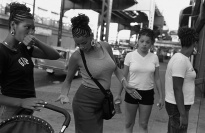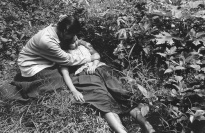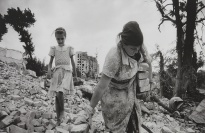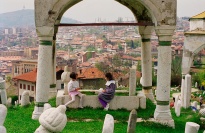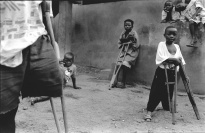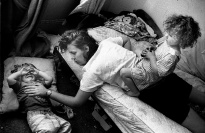About Moving Walls 5
Operating in nearly 50 countries around the world, the Open Society Foundations affects countless numbers of people each year. But for those at the Foundations who haven’t experienced firsthand the social and political situations we address, it’s possible to forget the urgency of our mission. What the photographs in this Moving Walls exhibit offer, both to the staff and to our visitors, is an unfiltered look at the people directly affected by the programs of the Open Society Foundations. Their artistry reveals the reality in each country—showing poverty, suffering, anger, and, most significantly, the hope that these conditions may be overcome.
Photographer Heidi Bradner’s work spans a decade, stretching from 1991–2001. Life in the Caucasus: A Bittersweet Decade observes the changes in the Caucasus following the collapse of the Soviet Union, presenting the hope and instability of the newly emerging nations.
In From Journey to Dream: Photographs by Karen Refugee Teenagers, Dwayne Dixon orchestrated a collaborative work with young Burmese refugees. By placing the cameras in the hands of the refugees and asking them to create pictures that tell their own stories, Dixon urges us to see not only the image in the photograph, but also the person taking the picture.
In Beyond Grand Street, photographer Régina Monfort immersed herself in Latin Williamsburg to document the trials of growing up in the Brooklyn neighborhood beyond gentrified North Williamsburg.
Photographer Darcy Padilla trains her camera on Julie Baird, a high school dropout and victim of child abuse, who is now a drug-addicted mother of four suffering from AIDS. The photographs in Birth and Death Certificates reveal not only the gritty realities of life in San Francisco’s Tenderloin district, but also the difficulties involved with untangling the complex and seemingly inextricable problems plaguing Baird and so many others.
In Sierra Leone: The Good, the Bad and the Very Ugly, Teun Voeten traveled to Sierra Leone during an armistice in February of 1998. When he arrived, however, “all hell broke loose,” and it was all he could do to make it home alive. While the dramatic story can be read in the artist’s statement, it is his pictures that capture the tension, brutality and, as he discovered, kindness in the embattled nation.
Born in Yugoslavia, Beka Vučo is now the Open Society Foundations’ regional director for the Western Balkans. Her collection, My Balkans, offers an intimate look at her homeland in the 10 years since Yugoslavia dissolved and reformed into smaller, independent countries.
While the Open Society Foundations’ dedication to the promotion of democratic values remains constant, our work necessarily changes as social and political situations shift. To the Open Society Foundations community and our guests, the exhibition serves as a reminder of the people for whom we work, the difficulty of their situations, and the hope that the walls they face can be moved.
